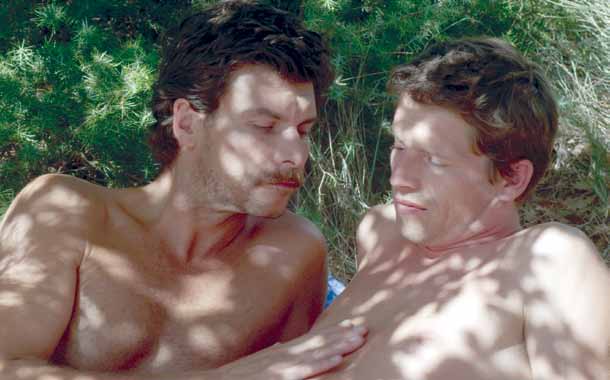 The year in queer film 2014 got off to a great start in January with the release of arguably the best queer film of the year, Alain Guiraudie’s explicit, erotic, and irresistible thriller “Stranger by the Lake.” The film placed considerable emphasis on full frontal nudity, a motif that was also visible in several films this year. Lars von Trier’s fascinating “Nymphomaniac” featured a parade of penises in “Part I” as Joe (Charlotte Gainsbourg), the film’s title character, recounts her multiple lovers, all of whom are seen naked from the waist down. Other memorable episodes in “Part II” include Joe being framed by two brothers (Kookie and Papou) and their elephantine erections, or her efforts to—ahem—arouse a Debtor Gentleman (Jean-Marc Barr). Even the campus comedy “Neighbors” promoted the penis. Zac Efron and his fraternity brothers make casts of their cocks to raise money—as well as hell and eyebrows.
The year in queer film 2014 got off to a great start in January with the release of arguably the best queer film of the year, Alain Guiraudie’s explicit, erotic, and irresistible thriller “Stranger by the Lake.” The film placed considerable emphasis on full frontal nudity, a motif that was also visible in several films this year. Lars von Trier’s fascinating “Nymphomaniac” featured a parade of penises in “Part I” as Joe (Charlotte Gainsbourg), the film’s title character, recounts her multiple lovers, all of whom are seen naked from the waist down. Other memorable episodes in “Part II” include Joe being framed by two brothers (Kookie and Papou) and their elephantine erections, or her efforts to—ahem—arouse a Debtor Gentleman (Jean-Marc Barr). Even the campus comedy “Neighbors” promoted the penis. Zac Efron and his fraternity brothers make casts of their cocks to raise money—as well as hell and eyebrows.
Teenagers grappling with their sexual identity were the basis for several enjoyable gay films in 2014. The best of the bunch was Darren Stein’s “G.B.F.,” a highly amusing high school comedy, where the gay teen wasn’t a pariah, but a desirable accessory. “Dear White People,” by out filmmaker Justin Simien, was a clever campus satire that featured a gay student, Lionel Higgins (Tyler James Williams), who may be the most complex of the four central characters. He is possibly exploited, and both mentally and physically abused, but develops a resilience that has viewers rooting for him. Likewise, Leo (Ghilherme Lobo), the blind gay teen in the very fine Brazilian film “The Way He Looks,” struggles with others people’s perception of him, even though he is quite confident about his same-sex desires for a fellow student.
 Also of note was out filmmaker Matt Wolf’s “Teenage,” a terrific documentary narrated, in part, by gay actor Ben Whishaw, about how teenagers came of age and developed between 1904 and the post-WWII era.
Also of note was out filmmaker Matt Wolf’s “Teenage,” a terrific documentary narrated, in part, by gay actor Ben Whishaw, about how teenagers came of age and developed between 1904 and the post-WWII era.
From London came “Pride,” the feel-good queer film of the year that had LGBT activists supporting striking miners during Thatcher’s iron rule. Other inspirational films out this year include “Violette,” about the bisexual French writer Violette Leduc (Emmanuelle Devos in a committed performance), who is encouraged to write by her friend Simone de Beauvier (Sandrine Kiberlain).
 In gay filmmaker Scott Coffey’s under-seen comic gem “Adult World,” Amy (Emma Roberts) was a would-be poet who harasses her favorite writer, Rat Billings (a wonderfully acerbic John Cusack), to get him to mentor her. His guidance comes at a terrific—and terrifically funny—price.
In gay filmmaker Scott Coffey’s under-seen comic gem “Adult World,” Amy (Emma Roberts) was a would-be poet who harasses her favorite writer, Rat Billings (a wonderfully acerbic John Cusack), to get him to mentor her. His guidance comes at a terrific—and terrifically funny—price.
Another sour comedy, gay writer/director Craig Johnson’s “The Skeleton Twins,” featured the queer Milo (Bill Hader) and his sister Maggie (Kristen Wiig), both of whom are suicidal. Milo, it seems, has not quite recovered from his illicit relationship with his English teacher (Ty Burrell) from when he was 15. While the twins have some fun lip-synching to Starship, much of “The Skeleton Twins” is a drag, and Hader plays a decidedly stereotypical gay character.
Better comic material was on display in “Obvious Child,” a sweet and snarky comedy about Donna (Jenny Slate), a stand-up comic who finds herself with child. Out comedian and writer Gabe Liedman had an impressive supporting turn as her gay best friend. And Liedman’s set, on stage in the film, killed.
One of the odder, and maddening, trends in LBGT cinema in 2014 was a filmmaker’s use of a final queer twist. This device may have been meant to change the viewer’s understanding of the characters, but more often than not, it left a very bad taste in one’s mouth. So—spoiler alert!—when Pastor Jay Reinke comes out in the last moments of the over-praised, underwhelming, and unfocused documentary, “The Overnighters,” it feels like a cheat. This portrait of a flawed man is really a flawed film. Likewise, queer writer/director Gregg Araki’s “White Bird in a Blizzard” is supposed to shock viewers with its finale, and the discovery that two male characters were having an affair, but the twist feels cheap and unearned. Even the “surprise” at the end of the dysfunctional family comedy “This Is Where I Leave You” reveals a characters’ same-sex relationship, but it scans more as a “gotcha” than a real moment.
What felt very real on screen this year was the relationship between Ben (John Lithgow) and George (Alfred Molina) in Ira Sachs’ touching drama “Love Is Strange.” Here, an older gay couple gets married, but is soon forced to live separately after George loses his job. This lovely, observational drama showcases a pair of touching performances by Lithgow and Molina, as well as some very nakedly emotional moments.
© 2014 Gary M. Kramer
Gary M. Kramer is the author of “Independent Queer Cinema: Reviews and Interviews,” and the co-editor of “Directory of World Cinema: Argentina.” Follow him on Twitter @garymkramer
Recent Comments